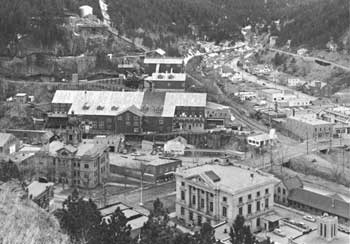






Survey of Historic Sites and Buildings
 |
DEADWOOD South Dakota |
 |
| ||
Ownership and Administration. Various private owners.
Significance. The Black Hills region was one of the last strongholds of the mining frontier, and it marked the end of the eastern advance of the prospectors. Because of the discovery of gold there, in 1875 the U.S. Army was finally forced to withdraw its opposition to the entry of whites into the Great Sioux Reservation. Thousands of miners poured in and made strikes. By the following spring Deadwood, a ramshackle town catering to the voracious appetites of 7,000 miners, was the center of activity. Among those whose names were associated with its heyday are "Wild Bill" Hickock, Calamity Jane, Poker Alice, and the legendary Deadwood Dick. In 1876 prospectors discovered approximately 50 mines in the vicinity of the town of Lead, 3 miles distant. That same year miners uncovered near Lead a gold lode that became the greatest mine of all in the Territory—the Homestake—which George Hearst purchased the following year. Becoming the biggest and most profitable in the United States, the mine has yielded most of the $550 million in gold that has been produced in the Black Hills since 1875.
 |
| Deadwood, South Dakota, retains much of the early mining atmosphere and many original buildings still stand. The town of Lead, 3 miles distant, was the site of one of the greatest mines in the Territory—the Homestake. |
Present Appearance. Deadwood is one of the few early mining towns to survive in the Black Hills. It retains much of the atmosphere of its early days, and many original buildings and the famous cemetery remain. At Lead a large number of buildings and the famous prise the Homestake property dominate the scene. Old two- and three-story framehouses are propped up on the gulch to keep them from slipping down to the stream at the bottom. The Homestake Mining Company provides guided tours of its mine. [23]
NHL Designation: 07/04/61
 |
 |
http://www.cr.nps.gov/history/online_books/prospector-cowhand-sodbuster/sitec14.htm
Last Updated: 22-May-2005